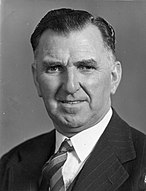New Zealand general election, 1943
|
|
||||||||||||||||||||||||||||||||||
|---|---|---|---|---|---|---|---|---|---|---|---|---|---|---|---|---|---|---|---|---|---|---|---|---|---|---|---|---|---|---|---|---|---|---|
|
||||||||||||||||||||||||||||||||||
|
|
||||||||||||||||||||||||||||||||||
|
All 80 seats in the New Zealand Parliament 41 seats were needed for a majority |
||||||||||||||||||||||||||||||||||
|
||||||||||||||||||||||||||||||||||
|
||||||||||||||||||||||||||||||||||
The 1943 New Zealand general election was a nationwide vote to determine the shape of the New Zealand Parliament's 27th term. With the onset of World War II, elections were initially postponed, but it was eventually decided to hold a general election in September 1943, around two years after it would normally have occurred. The election saw the governing Labour Party re-elected by a comfortable margin, although the party nevertheless lost considerable ground to the expanding National Party.
The Labour Party had formed its first government after its resounding victory in the 1935 elections and had been re-elected by a substantial margin in the 1938 elections. Michael Joseph Savage, the first Labour Prime Minister, died in 1940; he was replaced by Peter Fraser, who was widely viewed as competent even if he was less popular than Savage. In the same year as Fraser took power, however, the opposition National Party had replaced the ineffectual Adam Hamilton with Sidney Holland, and was beginning to overcome the internal divisions that had plagued Hamilton's time as leader.
As World War II continued, the issues surrounding it naturally came to dominate political debate. Shortages appeared, prompting a certain amount of dissatisfaction with the government. The matter of conscription was also contentious — although both Labour and National supported it, many traditional followers of Labour were angry at their party's stance. Many early Labour leaders, including Fraser, had been jailed for opposing conscription in World War I, and were branded hypocrites for later introducing it; Fraser justified his change of position by saying that World War I was a pointless war but that World War II was necessary. A faction of Labour, dissatisfied with the mainstream party's economic and conscription policies, followed dissident MP John A. Lee to his new Democratic Labour Party.
...
Wikipedia


